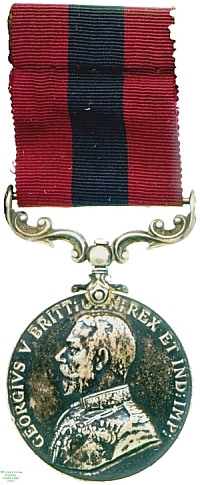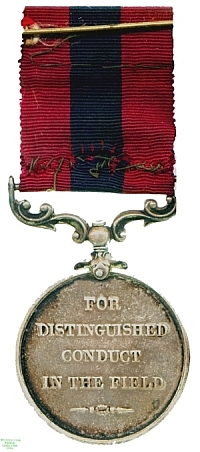
Obverse, a buts of King George V facing left

Reverse, inscription

Obverse, a buts of King George V facing left |

Reverse, inscription |
The Distinguished Conduct Medal was instituted in particular recognition of the gallant exploits of soldiers serving in the Crimea, but was awarded for distinguished conduct in later conflicts too; it was discontinued only in 1993.
This medal was earnt during the infamous Gallipolli campaign of the Great War of 1914-1918. After Germany's diplomacy had successfully induced Ottoman Turkey to join the Great War on Germany's side, a substantial naval force was amassed by the Allies against Turkey. Key to its operations was control of the Dardanelles Strait between the Aegean Sea and Sea of Marmora.
A large naval force was assembled to force passage through the Straits, but heavy losses necessitated a change of plan to infantry assault on the Gallipolli Peninsula to take control of the Straits overland. A force principally composed of Australian and New Zealand troops, supported with British home units and French marines, was landed and held on on the Peninsula for ten dogged months, mounting numerous ineffective offensives while naval support dwindled. Turkish resistance on all fronts proved more solid than had ever been anticipated and the troops were finally withdrawn in October when Bulgaria joined the war on the German side.
Among the British home units on the Peninsula was the 1st Battalion of the Border Regiment. When, on 25 April 1915, the British Expeditionary force landed at five points around the southern tip of the Gallipoli peninsular, the 1st Battalion landed at X beach. Among them was Corporal Edward Mott, who received promotion to Sergeant as well as this medal for the actions that the London Gazette for 3 June 1915 describes as follows: "No. 9887 Sergeant Edward Mott, 1st Bn Border Regiment. On 28th April, 1915, during operations South of Krithia for gallant conduct in leading his company to successive fire positions, and again for conspicuous bravery and good service in attacking over difficult country."
This medal forms part of what Lester Watson's catalogue lists as Group 2, and its provenance is discussed in the page for that group.